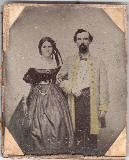
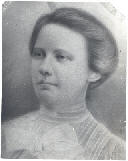
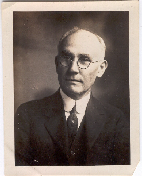
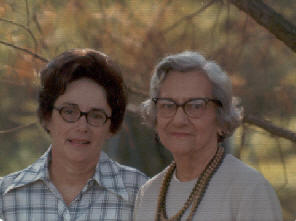
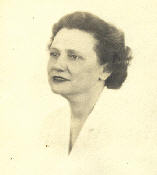
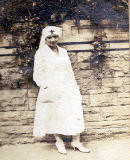
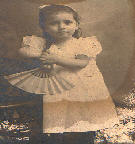



Helen Jackson McClure Jeanne McClure Sanders & Helen Jackson McClure Martha Davis & Granville Jackson Thomas D. Jackson Rebecca Hopkins Jackson
Balch Family
We are Balch descendants through our grandmother, Helen Jackson McClure.
Helen was the daughter of Thomas Davis Jackson and Rebecca Hopkins (pictures above).
Thomas Davis Jackson was the son of Granville T. Jackson and Martha Jane Davis (pictured above).
Granville T. Jackson was the son of Thomas Jackson and Elizabeth BALCH.
Thomas Jackson was in Bay Mount, TN in 1863, when he wrote a letter to his son Granville, who was serving during the Civil War.
Elizabeth, his wife, was still living at that time, and there were still daughters living at home, as well.
There are two wonderful books about the Balch family:
Balch Genealogica, by Thomas Willing Balch, and
Genealogies of the Balch Families in America by Galusha B. Balch.
We are Balch descendants through our grandmother, Helen Jackson McClure.
Helen was the daughter of Thomas Davis Jackson and Rebecca Hopkins (pictures above).
Thomas Davis Jackson was the son of Granville T. Jackson and Martha Jane Davis (pictured above).
Granville T. Jackson was the son of Thomas Jackson and Elizabeth BALCH.
Thomas Jackson was in Bay Mount, TN in 1863, when he wrote a letter to his son Granville, who was serving during the Civil War.
Elizabeth, his wife, was still living at that time, and there were still daughters living at home, as well.
There are two wonderful books about the Balch family:
Balch Genealogica, by Thomas Willing Balch, and
Genealogies of the Balch Families in America by Galusha B. Balch.
In “A History of the Balch Family” by Wm. F. Balch of New York, it states: The " Balche Family" in England appears to have existed at an early period. We find the name of Balche-man in the roll of Battle Abbey, dated 1066 ; this is the first mention we find of the name, which is thus spoken of: "The building of the Abbey meanwhile going forward, a goodly number of men were brought hither out of the neighboring counties, and some even from foreign countries, and to each of them, the Brethren who managed the Building allotted a dwelling Place, of certain dimensions, around the circuit of the Abbey :" (here follows a list of persons, and on the list, 104th, is) " Balchman of Bodeherstegate."
He further states that “Auton Balche” was mentioned as one of the persons assisting in the exercises following the baptism of Edward III. From this time forward the family appears, to have continued in Somersetshire.” In 1327 four taxpayers named Balch appear upon a Somerset tax list.
In “The Balch Family,” is stated “This is a very ancient Somerset family, well represented in Bridgwater by numerous inscriptions on gravestones.” George Balch b 1536, Somersetshire, England. The Balch's of Somersetshire were gentry and prosperous yeoman farmers. The sort of people who became Puritans. One of George's line served as mayor of his town. They proved during a 17th century visitation that they were entitled to bear a coat of arms. Another testament to their stature is that, in addition to being sometimes clergy who held seats, they often were called upon to be on the boards that oversaw local schools.
The two books mentioned above give a wonderful view of the earliest Balch’s.
He further states that “Auton Balche” was mentioned as one of the persons assisting in the exercises following the baptism of Edward III. From this time forward the family appears, to have continued in Somersetshire.” In 1327 four taxpayers named Balch appear upon a Somerset tax list.
In “The Balch Family,” is stated “This is a very ancient Somerset family, well represented in Bridgwater by numerous inscriptions on gravestones.” George Balch b 1536, Somersetshire, England. The Balch's of Somersetshire were gentry and prosperous yeoman farmers. The sort of people who became Puritans. One of George's line served as mayor of his town. They proved during a 17th century visitation that they were entitled to bear a coat of arms. Another testament to their stature is that, in addition to being sometimes clergy who held seats, they often were called upon to be on the boards that oversaw local schools.
The two books mentioned above give a wonderful view of the earliest Balch’s.
There were two Balch immigrants:
John (immigrated 1623 to the Plymouth Colony - (brief information given first)
and
John (immigrated 1658 to Maryland ).... our line
John (immigrated 1623 to the Plymouth Colony -
and
John (immigrated 1658 to Maryland ).... our line
John Balch, the earliest emigrant, came in 1623 to the Plymouth Colony in Massachusetts. It is known that he came from Bridgewater, Somersetshire, England. “He came with a colony in the charge of Captain Robert Gorges, son of Sir Fernando, who had a grant of a large tract of land which he wished to colonize. They landed at Wessegusset, now known as Weymouth, Massachusetts.”
John became known as one of the four “Old Planters,” along with John Woodbury, Roger Conant, and Peter Palfrey. An interesting quote about them is that “none of them or their descendants are known to have been among the persecutors of the Baptists, the Quakers, or the Witches, but, on the contrary, a descendant of Woodbury kept a horse saddled and a lantern lighted to aid any accused of witchcraft to escape, and a grandson of John Balch dared to sign a remonstrance against their persecution.”
There are interesting stories about those first hard years in the Massachusetts colony, many of which we learned as children. But John lived through them, and succeeded. By May 1631, John Balch and about eighteen others, being members of the church, were made freemen, that is, given the right to vote and hold office. In 1638 he built a two story frame house upon his land, in which he spent the remainder of his life. “In it his son Benjamin and Benjamin's grandson Benjamin lived and reared their families. From this last Benjamin it passed to his daughter Deborah [Balch] Dodge in which family and name the house has continued to the present time. The Balch house, although subjected to some changes, is still standing in a good state of preservation. Roger Conant and John Woodbury also built houses near by.”
John was married twice, first to Margary (Lovett) and they had three sons: Benjamin (born winter of 1628/9, died after Jan 21, 1714/15) , John (born abt 1630, died June 16, 1663) , and Freeman (born about 1631, died about 1658). John’s second wife was Agnes or Annis Patch, who gave him no children.
John became known as one of the four “Old Planters,” along with John Woodbury, Roger Conant, and Peter Palfrey. An interesting quote about them is that “none of them or their descendants are known to have been among the persecutors of the Baptists, the Quakers, or the Witches, but, on the contrary, a descendant of Woodbury kept a horse saddled and a lantern lighted to aid any accused of witchcraft to escape, and a grandson of John Balch dared to sign a remonstrance against their persecution.”
There are interesting stories about those first hard years in the Massachusetts colony, many of which we learned as children. But John lived through them, and succeeded. By May 1631, John Balch and about eighteen others, being members of the church, were made freemen, that is, given the right to vote and hold office. In 1638 he built a two story frame house upon his land, in which he spent the remainder of his life. “In it his son Benjamin and Benjamin's grandson Benjamin lived and reared their families. From this last Benjamin it passed to his daughter Deborah [Balch] Dodge in which family and name the house has continued to the present time. The Balch house, although subjected to some changes, is still standing in a good state of preservation. Roger Conant and John Woodbury also built houses near by.”
John was married twice, first to Margary (Lovett) and they had three sons: Benjamin (born winter of 1628/9, died after Jan 21, 1714/15) , John (born abt 1630, died June 16, 1663) , and Freeman (born about 1631, died about 1658). John’s second wife was Agnes or Annis Patch, who gave him no children.
John died at his estate on Bass River, in May, 1648. His will was duly made and filed among the Essex County records, where it now is. The inventory of John Balch's estate rendered by Benjamin Balch, February 2, 1648-9, amounted to £220 13s, 4d
Thomas Willing Balch in his Balch Genalogica stated that the book Genealogies of the Balch Families in America by Galusha B. Balch, gives a good account of the Massachusetts family, but that the account of the family in Maryland “is not accurate.”
Thomas Willing Balch in his Balch Genalogica stated that the book Genealogies of the Balch Families in America by Galusha B. Balch, gives a good account of the Massachusetts family, but that the account of the family in Maryland “is not accurate.”
I have made no concerted effort to determine his descendants, as we are not from his line. This is all I will relate:
1. JOHN BALCH (immigrant 1623 Plymouth Colony) (d.May 1648)
sp: Margery LOVETT
|-
| sp: Unknown
| |-
| |-
| | sp: Elizabeth WOODBURY
| |-
| |-
| |-
| |-
| |-
| |-
| +-
|-
|-
2nd sp of John: Agnes PATCH
-
John Balch, immigrant to Maryland in 1658:
Generation One:
EDWARD BALCH (Feb 1603 Ilchester, Somerest England – died by January 1640): Edward Balch married Mary Calle on 11 Aug 1629 in Ilchester, Somerset, England. Edward’s father’s name was apparently John BALCH and his mother’s name is unknown. It seems evident that Edward and the other John Balch (immigrant to Massachusetts Colony) were of the same family - as both were located in Somerset, England, but their exact relationship is not known. "The will of EDWARD BALCH is found in the York Registry, January 25th, 1640, York, fol 78, city." The emigrant John Balch (to Maryland) was the son of Edward Balch and Mary Calle,
Generation Two:
JOHN BALCH, son of Edward, was born about 1630/1631 in Bridgewater, Somersetshire, England. Bit and pieces can be learned about John: that he “belonged to the Presbyterian wing of the English church and his son and his grandchildren were brought up in that faith.” And that he “became possessed of large property and extensive influence.” John BALCH and Catharine CLELLAND (sometimes spelled McClelland, “of a Scottish family”) were married in 1659 in Deer Creek Settlement, Maryland Colony. Children are commonly stated to have been: Thomas BALCH and Robert BALCH. I don’t know when John died.
His emigration is documented by the following, on file in Liber 6, folio 89, in the Maryland Land Office at Annapolis: “John Baltch enters his own right transported in the year 1658, the which he assigned the following:
"I, John Baltch, do assign over unto John Lloyd all my right, title and interest of one right due unto me for my transportation in the province, as witness my hand this 30th day of December, 1663. The mark of X John Baltch." Witness, Dan'l Jenifer. [John made his mark on the document, because he was sick at the time, “but he could both read and write.” ]
This was land he was entitled to for providing his own transportation to the colony. The land was given to encourage settlement. A single man was given 100 acres, which was subject to a nominal yearly rental. This land he could transfer for a consideration, as the above entry shows. In 1683 the Proprietory proclaimed new "Conditions of Plantation," as the term ran, by which anyone could obtain warrants for any quantity of land, not already disposed of, by the payment of a small amount of purchase money, and afterwards of a trifling annual "quit rent." This system continued until after the Revolution.
Generation Three:
THOMAS BALCH, son of John, was born about 1660 at Deer Creek, Harford Co., MD. He apparently died in 1730. Thomas Willing Balch of Philadelphia, who wrote Balch Genealogica, is traced from John Balch who settled in Maryland in 1658 and, on the authority of family manuscripts, is said to have been the father of Thomas Balch who, after going to England and participating Monmouth's rebellion, returned to Maryland and died there in 1730. “The descendants of this Thomas Balch, numbering not a few men of eminence, are very fully treated [in the book] and the copious biographies are decidedly interesting.”
Thomas Willing Balch wrote of Thomas: "The elder of the two sons…. Thomas, who was born about 1660, was of a restive and impulsive disposition, and fond of moving about and adventure. When not much over twenty he went over to Somersetshire. In England he knew Richard Gaxter and was much influenced by that eminent divine. Brought up a Protestant, he readily, when "King Monmouth" raised his standard in southwestern England in June, 1685, joined the Duke's forces, and became a captain in his army. After the disastrous battle of Sedgemoor, July 5th, 1685, in which Monmouth's army was routed and his cause destroyed, Thomas Balch found it advisable, owing to the activities of the notorious Colonel Kirke and his men, known as "Kirke's lambs," to leave England for the New World. Accordingly, shortly after, he sailed, disguised, from Bristol and landed at Annapolis, Maryland, in 1685. His part in Monmouth's rebellion was the thread round which George Parker, at one time Mayor of Bridgwater, Somerset, wrapped an account of Monmouth's rising in a book entitled, Tom Balch; an Historical Tale of West Somerset during Monmouth's Rebellion. This book was published at Bridgwater in 1879.
"Mr. Parker, in his preface, says: — "In the course of a long and active life amidst its toils, my amusements have been of a literary character. Amongst the many manuscripts in my possession I have selected for publication an Historical Tale. The reader will find it evinces the strong and ardent feelings towards Protestantism, manifested by the county families of Somersetshire at the time of Monmouth's Rebellion, and it displays the severe trials some of them endured. " The Poems appended are mostly written in the Somersetshire dialect, and are intended to describe and commemorate what the peasantry, and some immediately above them, were about many years ago, and to evidence a noble heartiness of character worth recording." Mr. Parker in his book represents the father of Tom Balch as the owner of Saint Audries. [However,] it was not until much later, in 1764, that Saint Audries came into the possession of another branch of the Balch family.
He further wrote of Tom: [Monmouth] came as the champion of the Protestant cause, and most flattering was his reception. Here opened a field suitable to the spirit and taste of Tom Balch, who upon hearing the day he was to enter Taunton, made a point of being there. It was the first time in his life he had ever witnessed anything like a military procession, and when they entered the town, what with the display of uniforms and the enthusiasm of the people, his heart was at once devoted to Monmouth. He was well known at Taunton as the heir of a family of distinction in the neighborhood, and very soon obtained an introduction at headquarters. As the Duke was most anxious to enlist in his cause every one of note, when Tom was introduced to him he was welcomed most cordially, flattered by remarks on his fine natural figure and soldier-like appearance, which only required military accoutrements to make it complete. A Captain's commission was offered him ; he was flattered and hastily promised, ere he left Taunton, to take an oath of allegiance to the Duke as his sovereign, who really admired him for his frankness of manner, and it was contrived military clothes should be supplied to him, and he became really and earnestly a captain of the Duke's army.
"Mr. Parker, in his preface, says: — "In the course of a long and active life amidst its toils, my amusements have been of a literary character. Amongst the many manuscripts in my possession I have selected for publication an Historical Tale. The reader will find it evinces the strong and ardent feelings towards Protestantism, manifested by the county families of Somersetshire at the time of Monmouth's Rebellion, and it displays the severe trials some of them endured. " The Poems appended are mostly written in the Somersetshire dialect, and are intended to describe and commemorate what the peasantry, and some immediately above them, were about many years ago, and to evidence a noble heartiness of character worth recording." Mr. Parker in his book represents the father of Tom Balch as the owner of Saint Audries. [However,] it was not until much later, in 1764, that Saint Audries came into the possession of another branch of the Balch family.
He further wrote of Tom: [Monmouth] came as the champion of the Protestant cause, and most flattering was his reception. Here opened a field suitable to the spirit and taste of Tom Balch, who upon hearing the day he was to enter Taunton, made a point of being there. It was the first time in his life he had ever witnessed anything like a military procession, and when they entered the town, what with the display of uniforms and the enthusiasm of the people, his heart was at once devoted to Monmouth. He was well known at Taunton as the heir of a family of distinction in the neighborhood, and very soon obtained an introduction at headquarters. As the Duke was most anxious to enlist in his cause every one of note, when Tom was introduced to him he was welcomed most cordially, flattered by remarks on his fine natural figure and soldier-
"He procured a short leave of absence to make his friends at home acquainted with the change in his affairs." After returning to Maryland, Thomas Balch married Agnes Somerville, and died in 1730." [I have not researched the Somerville family, yet!]
Generation Four:
HEZEKIAH BALCH, was born about 1688 in Deer Creek, Harford County, Maryland Colony, and died there about 1745. Thomas Willing Balch wrote: “He was brought up in the Presbyterian faith, and received from his father what was for those days a good education. At the end of 1720 he was appointed administrator of the estate of William Jenkins. The record of this runs thus: "'Wm. Jenkins his adm.' Bond in Comon forme by Heza Balch his adm. with Thomas Johnson & John Duely his sureties in fifty pounds sterd. Dated December 27, 1720."
He married twice; first Martha Bloomer, and second to Sarah . By his first wife he had two sons, both born in Saint George's Parish, Maryland: James and John.
Hezekiah married MARTHA BLOOMER on 30 Jul 1707 in St. Anne's Parish, Maryland Colony, daughter of STEPHEN BLOOMER and ELIZABETH BEALE. She was born about 1690 in Baltimore, Maryland Colony, and died Jan 1715/16 in Deer Creek, Harford, Maryland Colony. He married (2) Sarah [Ford] before Nov 1717.
Hezekiah and Martha had the following children:
Hezekiah and Martha had the following children:
1) .James BALCH was born 5 Dec 1714 and died 1779.
2) JOHN BALCH of "Balch's Abode" was born 23 Jan 1716.
By his second wife, Sarah, they had the following children [these children and their dates of birth are from St. George's Parish Register of Births, Marriages and Deaths, 1692-
3) Thomas BALCH was born 15 Nov 1717 in St. Georges Parish, Harford County, Maryland.
4) Hezekiah BALCH was born 6 Mar 1721 in St. Georges Parish, Harford County, Maryland.
5) Mary BALCH was born 2 Oct 1725 in St. Georges Parish, Harford County, Maryland.
Next
-
I thought I would mention, here, the other James Balch “of Wales.” This is the James Balch who married Ann Bloomer. The stories passed down about him are very interesting. One tradition, related by several descendants, one of them Mrs. Albina Bloomer Mann, daughter of Rev. James Balch, is that her paternal ancestor, of the fifth or sixth generation back, was kidnapped with other boys and girls on the coast of Wales, to be brought to America and sold to planters for a sufficient length of time to pay their ocean passage. He fell in love with a fair captive named Ann Bloomer, and in due time they were married. After taking them, the captain of the vessel became suspicious of detection, and set them ashore on the coast of Scotland, where they remained for several years, were married, and then emigrated to America. Dr. Calvin W. Balch has also given this tradition, except as to the marriage, and says that it was James, the father of Rev. James Balch, who was taken to Scotland, and there apprenticed to a shoemaker. While playing on the beach the steward of a vessel stopping for water offered him passage to Georgetown, which he gladly accepted.
I really know very little about this James or his descendants. And I cannot account for the fact that there were two “Bloomer” girls, both married to Balch men.... Related?
Please know that all of this information is to the best of my knowledge. But additions and corrections are always welcomed!
I really know very little about this James or his descendants. And I cannot account for the fact that there were two “Bloomer” girls, both married to Balch men.... Related?
Please know that all of this information is to the best of my knowledge. But additions and corrections are always welcomed!